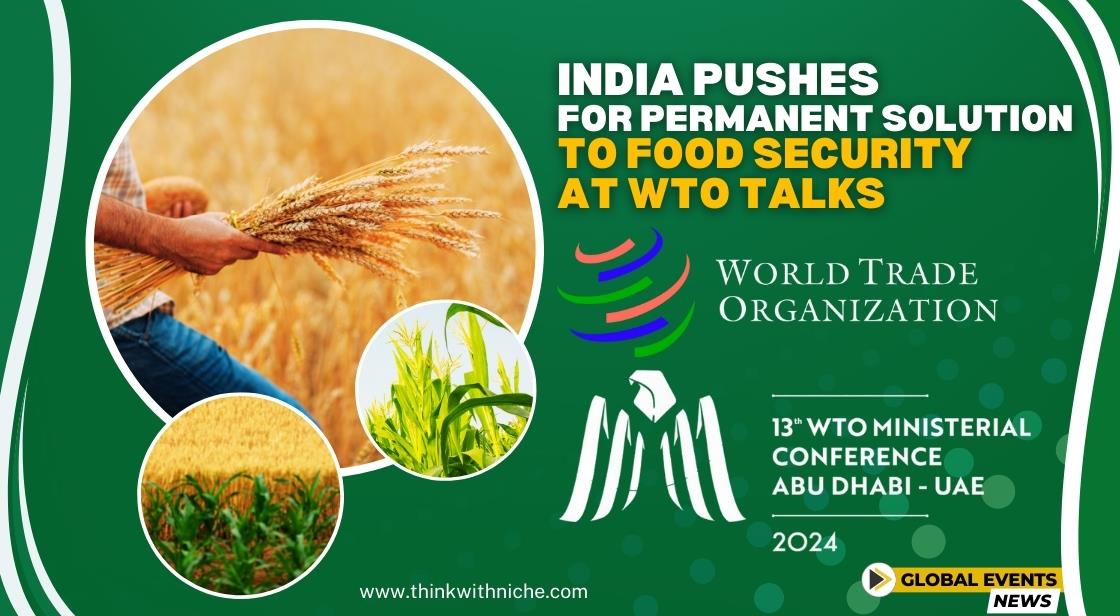India Pushes for Permanent Solution to Food Security at WTO Talks

News Synopsis
India has taken a strong stance at the ongoing World Trade Organization (WTO) Ministerial Conference in Abu Dhabi, advocating for a permanent solution to the Public Stockholding (PSH) issue. PSH refers to the practice of governments like India storing essential commodities like rice and wheat to ensure food security for their citizens. This issue has been pending for 11 years at the WTO, with India arguing that resolving it is crucial for achieving food security and improving the livelihoods of millions in developing nations.
India's Call for Permanent PSH Solution at WTO Talks
India has emerged as a vocal advocate for a permanent solution to the Public Stockholding (PSH) issue at the ongoing World Trade Organization (WTO) Ministerial Conference in Abu Dhabi. This issue, which has remained unresolved for 11 years, is critical for nations like India, where PSH plays a vital role in ensuring food security for millions of citizens.
Advocating Food Security and Livelihoods Enhancement
India argues that resolving the PSH issue is not just about trade, but about uplifting the lives and livelihoods of its most vulnerable populations. By maintaining strategic food reserves, India can mitigate the impact of price fluctuations and unforeseen circumstances, ensuring a steady supply of essential commodities at affordable prices. This, in turn, contributes to greater food security and increased household income, especially for resource-poor families.
Global Backing and Disparities in Subsidies Highlighted
India's stance on PSH is not an isolated one. They have garnered support from over 80 countries representing more than half the world's population. This demonstrates the global significance of this issue and the shared concerns among developing nations regarding food security.
Furthermore, India has highlighted the significant disparity in agricultural subsidies provided by different countries. While developed nations often offer per-farmer subsidies that are 200 times higher than those provided by developing countries, developing nations like India are expected to limit their PSH programs under current WTO rules. This creates an uneven playing field, hindering developing countries' efforts to ensure food security for their citizens.
Sequential Approach to Agricultural Reforms Urged by India
India advocates for a sequential approach to agricultural reforms at the WTO, prioritizing the permanent resolution of the PSH issue before addressing other reforms. They believe that resolving PSH is crucial for addressing the immediate food security concerns of developing nations, paving the way for further discussions on other agricultural reforms.
Additionally, India emphasizes the importance of upholding the special and differential treatment provision within the WTO's agreement on agriculture. This provision offers flexibility for developing countries in implementing WTO rules, acknowledging their unique challenges and development needs.
The Ongoing Debate at WTO and Future Negotiation Outlook
India's call for a permanent PSH solution highlights the ongoing debate at the WTO regarding the balance between trade liberalization, food security, and the needs of developing nations. Reaching a consensus on this complex issue will require constructive dialogue and a willingness to address the concerns of all stakeholders. The future outlook of the negotiations remains uncertain; however, India's strong stance and growing global support could potentially pave the way for a more equitable and food-secure future for developing nations.
Key Points of WTO Talks:
-
India emphasizes the need to balance trade interests and food security: They argue that focusing solely on the trade benefits of developed nations, who often provide significantly higher per-farmer subsidies (up to 200 times higher), neglects the fundamental needs of developing countries struggling with food insecurity.
-
Over 80 countries support India's proposed PSH solution: This represents more than half the world's population, highlighting the global significance of this issue.
-
India advocates for a fair and level playing field: They urge the WTO to address the imbalance in agricultural subsidies, ensuring resource-poor farmers in developing countries have a fighting chance.
-
Sequential approach to agricultural reforms: India emphasizes the importance of prioritizing the permanent resolution of PSH before addressing other agricultural reforms. Additionally, they advocate for upholding the special and differential treatment provision for developing countries within the WTO's agreement on agriculture.









